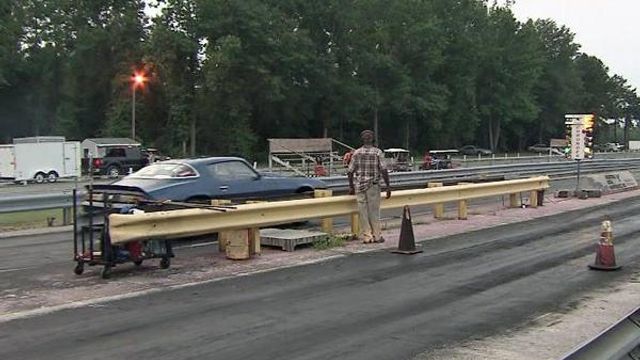Safety varies at N.C.'s 'outlaw' racetracks
There are dozens of race tracks and drag strips across North Carolina, and a good number of them have no regulation or safety requirements because the state does not regulate them.
Posted — UpdatedIf tracks aren't part of a racing organization, they are independent – or what race fans often refer to as "outlaw tracks."
In May, spectator Terry McDougald was killed at an outlaw track, Harrells Raceway in Sampson County, when a drag racer crashed and the engine few through a fence.
Harrells Raceway Manager Larry Butcher says racing is inherently dangerous and that state regulation wouldn't necessarily prevent an accident.
"Racing is a dangerous sport," he said. "The most important thing is that you have to pay attention."
In 2003, a suped-up Jeep flew into a crowd at Five County Raceway in Franklin County, killing Candace Brown and injuring her young daughter. At that track, the spectators were allowed to stand inside the fence. The raceway has since been closed.
Theresa Medlin says she finds it hard to believe that there is no state regulation. She was seriously hurt in that Franklin County crash, and she still believes it's a miracle she survived.
"I was buried in mud, it was my understanding," she said. "It had torn my clothes from me. One of the guys with us put a shirt over me, and he didn't even know it was me because there was so much mud all around."
Medlin says she doesn't remember the crash, just the aftermath, in which she suffered two broken legs, a dislocated elbow and plenty of emotional scars.
Race tracks that are part of groups such as the International and National Hot Rod associations, do have safety requirements, such as vehicle inspections, EMS crews on site, guardrails and fencing. They also require insurance.
"Outlaw tracks is 'run what you brung,' and you're on your own as far as safety," said Brian Williams, who owns the Dunn Benson Dragstrip which is part of IHRA.
The state Motorsports Council focuses on jobs and tourism, and the industry isn't pushing the door on regulation.
"When you get state regulation, you hinder expansion and improvements. I've seen it happen in other industries. It stifles growth," said Steve Earwood, who owns the Rockingham Dragway and is chairman of the North Carolina Motorsports Association.
Earwood says accidents are rare and that most tracks have insurance policies that demand safety.
"Insurance comes out every year and looks at the fencing and guard rails," he said. "I can't think of any permanent facility in the state that doesn't have insurance."
Still, with no state regulation, insurance isn't required on the outlaw tracks. North Carolina Insurance Commissioner Wayne Goodwin says the current setup puts responsibility on spectators.
"I certainly hope that people who offer these races cover themselves. The people who attend need to make strong inquiries to see if the tracks provide coverage," Goodwin said.
Department of Insurance spokeswoman Kristin Milam added: "I think the best way to put it is that we always encourage any commercial outfit to take all the proper precautions to protect their customers, including having adequate insurance coverages. Generally, we want everyone to have more insurance than less."
"As far as mandating motorsports facilities to have insurance - we are not the experts on motorsports and their race tracks, and we would defer any mandates and/or recommendations to the N.C. Motorsports Advisory Council," she added.
Butcher says he is working to raise the guard rails at Harrells Raceway after the crash that killed McDougald, but he still feels his track is pretty good compared with others. Harrells Raceway is insured, he said.
"There's tracks that are in worse condition than this," he said. "They don't even have rails up. It's like street racing."
Medlin says she can't help but feel that more is needed, and she says she doesn't feel the fans should have to do all the homework.
"Across the board, there have to be some safety precautions," she said.
Some states do have oversight. New Jersey State Police are in charge of regulation in that state, and it's under the fire marshal's command in Georgia.
The motorsports industry supports more than 27,000 jobs in North Carolina and contributes more than $6 billion to the state's economy each year, according to a Feb. 11 news release from Gov. Bev Perdue.
• Credits
Copyright 2024 by Capitol Broadcasting Company. All rights reserved. This material may not be published, broadcast, rewritten or redistributed.





